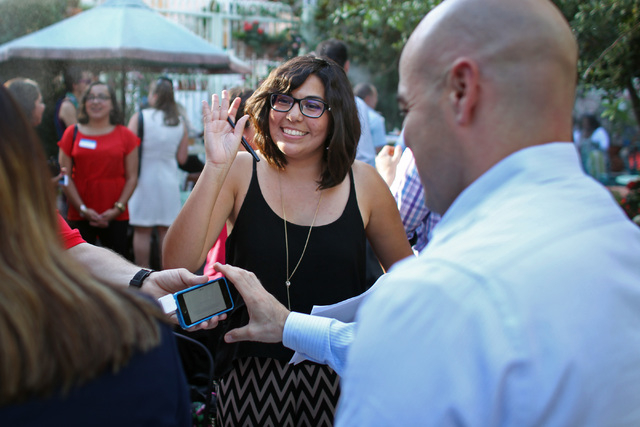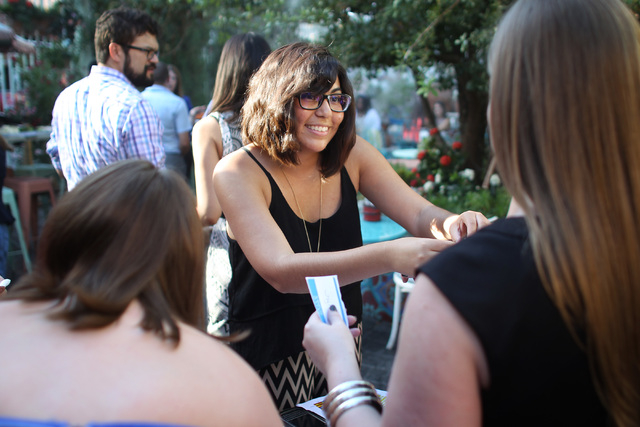Immigration advocate pushes her dream for DREAMers
Blanca Gamez stared at the white, unmarked door inside the White House and nervously began thinking about who was on the other side.
She knew her story about being undocumented.
She knew her passion for immigration reform.
She just didn’t know if she was prepared to share it on this level.
“Then President (Barack) Obama opened the door to his office, the Oval Office,” she recalls. “Then he came out and shook our hands one by one.”
Gamez, 25, was one of six DREAMers — a term for people who came into the United States undocumented as children — who met with the president in February to talk about immigration reform.
During the next hour, the DREAMers shared their stories and hopes for how the laws will change.
Gamez’s journey toward the White House started when she was 7 months old.
“I left everything to give my family and especially my daughter better opportunities,” Amelia Gamez, Blanca’s mother, says. “I never thought that her daily struggle being undocumented would be the path she was destined for to make a change.”
Blanca Gamez says it’s hard for her mother to talk about the journey from Mexico to Las Vegas even now.
“She has only told me once,” she says. “There is just so much trauma and PTSD from the experience that she gets worked up talking about it.”
Blanca Gamez’s father came to the United States on a work permit and became an engineer. But her mother was unable to get a visa. With 7-month-old Blanca in tow, she tried to make the journey on her own.
“She was caught and returned,” Blanca says.
Blanca’s father wanted to return home to help. But her mother told him no. She said she’d find another way.
So, Blanca was brought to the United States by her uncle, a U.S. resident. Her mother tried — and succeeded — the second time around when she entered the country solo.
“My dad was already set up in Las Vegas,” Blanca says. “He picked my mother and me up from California and brought us here.”
Blanca Gamez didn’t know about her undocumented status until later in life.
“My sister was born two years after me, and she is a U.S. citizen,” she says. “I knew something was different. She would vacation back to Mexico, but I was never allowed to go.”
Gamez’s understanding of the situation grew when she took driver’s education in school but was told by her parents she couldn’t get her license.
During high school, she developed close friendships with other undocumented students. As graduation approached, they discussed how they’d get into college despite their status.
“We knew other people had done it,” Gamez says. “But we didn’t know how.”
Gamez was determined to pursue higher education.
“My parents were always pushing education,” she says. “My dad was the type that when he first got here, he starting taking English classes at (the College of Southern Nevada) to learn. He knew education would change our lives.”
Gamez applied to UNLV and revealed her status to her admissions counselor.
“He told me it wasn’t a problem,” she says.
She was admitted and started studying political science at UNLV in 2008.
Gamez’s parents saved what they could for their daughter’s education. They knew she wouldn’t have many opportunities for grants and scholarships as an undocumented student.
“But it was still hard,” she says. “There were a few times they asked me to go part time because they couldn’t afford full time.”
While in college, she pushed for immigration reform, using her story — alongside other DREAMers — to inspire change.
She interned and worked for political organizations such as the Nevada Democratic Party. When Gamez graduated from UNLV in 2012, she faced another setback — she was offered jobs she couldn’t take because of her undocumented status.
But Gamez didn’t give up. She went back to school to finish an English degree.
“But a lot happened between now and then,” she says.
One night in June 2012, Gamez turned off her cellphone as usual when she went to sleep. But the house phone awakened her.
A friend was calling to tell her she needed to get to Progressive Leadership Alliance of Nevada’s office. President Obama was about to make an announcement that would change her life.
“I turned on my phone and saw how many voice mails, texts and Facebook messages I had from people trying to get in touch with me,” she says.
Gamez tied her hair in a ponytail and reached the office just after the announcement.
Obama proposed setting up Deferred Action for Childhood Arrivals, which allowed temporary relief for people younger than 30 who arrived in this country before they were 18. DACA would let DREAMers get work permits and be exempt from deportation.
People could start applying for the program Aug. 15, 2012.
Gamez volunteered as a case worker with Hermandad Mexicana Transnacion, helping hundreds of applicants fill out their DACA paperwork.
“I arrived at 7 a.m. the first day,” she says. “There was a line around the corner.”
More than 500 people cycled through the office over the next month trying to get their paperwork together to apply. Gamez worked tirelessly to help others and didn’t finish her own work until late September.
“So when everyone kept getting their letters saying they qualified, I was still waiting,” she says.
After she qualified, she was able to obtain a driver’s license and start taking job offers.
In 2014, she graduated with her second degree and was in line to work at Battle Born Nevada, a communications nonprofit formerly known as Progress Now Nevada.
But this was just the beginning of her journey.
Gamez’s passion for reform, and her presence in the movement for change, continue to increase. And people noticed more and more stories of DREAMers in Nevada.
Then one day, Gamez received a call from Washington, D.C., asking her if she could travel there to meet with White House staff to discuss immigration reform.
“I almost didn’t go,” she says.
For a week, she strained to get details. Then, on a Tuesday, the day before her meeting, she was told to board a plane.
“They said I would be meeting with the president,” she says. “They said they had been trying to work out the details for the last week.”
During the flight, Gamez prepared what she would say to the president. Her parents were amazed.
“I couldn’t believe it,” Amelia Gamez says. “The journey and struggles were worth it all. And as a mother, I am always proud of my daughters. But, I was very proud of her.”
Gamez was one of six to arrive to meet with the president. They were told they’d have 30 minutes to share their ideas about immigration reform. Obama extended the meeting to an hour.
Battling nerves, Gamez shared her story and described her time volunteering to help other DACA recipients.
“I just thanked him for changing our lives,” she says. “I told him because of (deferred action) people were going back to school and starting businesses.”
She says she’ll never forget being able to give the president suggestions about reform or how Obama encouraged her to go to law school — a dream of hers — sooner than later.
“He looked at his watch and said, ‘Time’s running out,’ ” she says.
Before wrapping up and taking a photo with the president, Gamez asked him one odd favor.
“I knew the history of his desk, so I asked if I could touch it,” she says, referring to the Resolute desk, which gets its name from an abandoned British ship named the Resolute — three desks were made from the wood of the ship, one of which was given to President Rutherford B. Hayes and used by multiple U.S. presidents.
Gamez continues to fight for change. On May 5, she discussed the immigration system with presidential candidate Hillary Clinton during Clinton’s visit here.
Immigration reform is vital to Gamez’s mixed-status family. Her sister is a U.S. citizen. Her father is a permanent resident — her sister applied on his behalf. Gamez is a recipient of DACA. But her mother is still undocumented.
“She was going to have relief through DAPA,” she says referring to Deferred Action for Parental Accountability, another proposal by the president to help the parents of DREAMers but was blocked. “But now, she is in limbo.”
But her parents believe Gamez can make a difference. She already has.
“I wouldn’t call myself an activist,” Gamez says. “That’s a great title to have but that’s not me. I’m just an individual who wanted to change something so I’m changing it.”
Contact reporter Michael Lyle at mlyle@reviewjournal.com or 702-387-5201. Follow @mjlyle on Twitter.





























